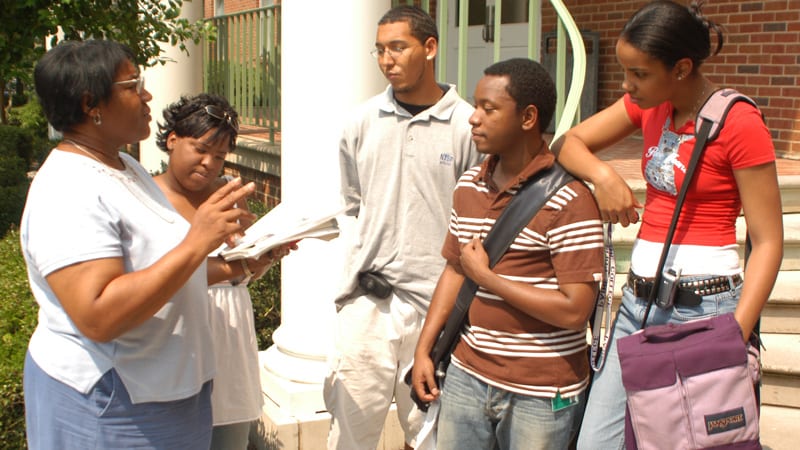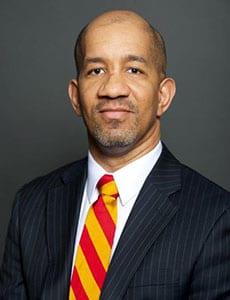Reducing Barriers Part I: Increase Access to Guidance Counselors

Editor’s note: This is the first of our three-part series highlighting ideas to reduce barriers to attending college faced by low-income or first-generation minority college-bound high students. Driven by recommendations in the UNCF-produced report, A Seat at the Table: African American Youth’s Perceptions of K-12 Education, calls to action include fact-based suggestions for improving educational outputs for students with a desire to pursue a college education.
- Reducing Barriers Part II: Invest in School and University Partnerships
- Reducing Barriers Part III: Creating Awareness on the Value of HBCUs
What’s the largest roadblock preventing a high schooler from attending college once they graduate? We automatically think money. Do I have enough money for school? Have my parents saved enough for my classes and books? Can I afford a loan for my child’s tuition? While other barriers exist, the financial barrier is probably the largest challenge anyone faces when deciding on a degree after high school. But the lack of information about the college process also prevents one from moving past their high school education into an associates or baccalaureate degree program. The information barrier for African American students far outweighs that of their white peers.
The old adage ‘you don’t know what you don’t know’ can certainly be applied here. Sure, we live in a technology-driven age where information is literally at our fingertips. But access to information on how to get to and through college is still an obstacle. This is especially true for first-generation college students, as most African American college students are. But what can be done about it? How can we improve the educational outcomes for black youth and ensure they are given effective information to equip them to make the decision to attend college?
According to UNCF’s report, A Seat at the Table: African American Youth’s Perceptions of K-12 Education, over 10% of African American youths surveyed say that lack of support services in school is their biggest obstacle to getting into college. These include access to the services provided by school guidance counselors. The school counselor role goes far beyond recommending a college or university to a student or writing letters of recommendation for college hopefuls. School guidance counselors actually play a critical role in student success and should be considered a vital addition to the educational team. Oftentimes these professionals can plant the seeds of going to college and make recommendations on which courses would put the student into the correct path for college readiness. They not only have relationships with admissions officers in colleges and universities; they also have a strong connection with community stakeholders. These professionals understand the climate within their schools, they know which students have the most need, and can make recommendations as to how to improve the educational environment that will really work in their schools. Because they are highly trained in child development and learning strategies, they are fully equipped to advocate for change within their schools.
Unfortunately, not every school in low income areas employ counselors. Did you know that African American students are 1.2 times as likely as white students to attend a school where there is a sworn law enforcement officer, but no school counselor? Let that sink in. Our—yes, our children are attending schools where districts felt it more important to employ a police officer than a guidance counselor. Let’s break that down a little more. The job of the school enforcement officer is to ensure the school is safe for learning and may deter students from delinquency. Kudos—our kids do need to learn in safe environments—no argument there. But the school resource officer isn’t trained to help kids get into college. Nor are they able to recommend a path of courses or resources to help our students prepare for college. Guidance counselors, however, are trained and skilled at creating college ready environments. The UNCF report goes on to mention, “If schools and colleges are serious about increasing college readiness and attendance, advising must be a key priority.”
This is the type of support African American children need—support that helps them move beyond high school and into college. To help high schoolers understand the complexities of college, the need for school counselors is greater than ever before. And while other barriers to attending college exist and there are several ways to close the opportunity gap, maybe school counselors can be considered one small piece of the puzzle in helping African American youth achieve academically and matriculate into a college of their choice.
 Sekou Biddle, UNCF’s vice president for advocacy, leads UNCF’s advocacy efforts to ensure more African American students will be college-ready and better prepared to enroll in and complete college by driving sustainable education reforms that benefit students and empower parents and communities to demand improvement.
Sekou Biddle, UNCF’s vice president for advocacy, leads UNCF’s advocacy efforts to ensure more African American students will be college-ready and better prepared to enroll in and complete college by driving sustainable education reforms that benefit students and empower parents and communities to demand improvement.